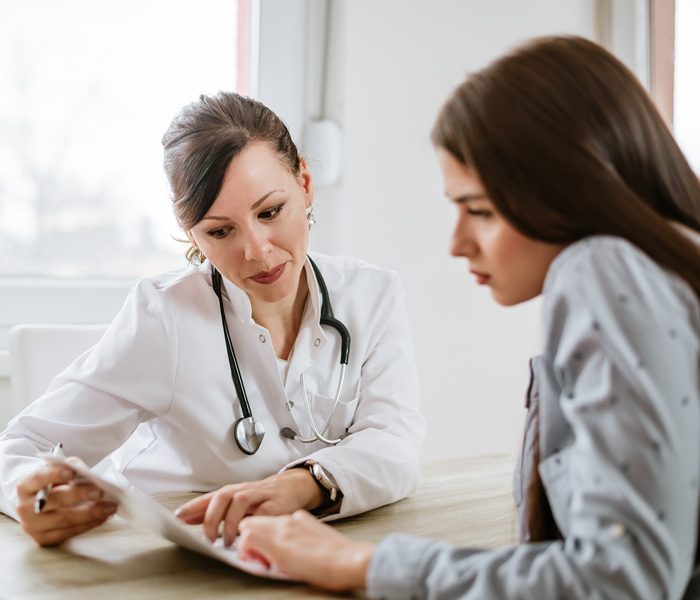Women's Health
At the South Florida Urology Institute, we will address your specific and unique urologic needs to cultivate a personalized treatment plan that fits with your overall wellness plan.
Women’s Health Doctor in Jupiter, Florida
Many urologic conditions occur more commonly in women. Different urinary conditions may affect women during various stages of their lives. Routine checkups with your Ob/GYN and safe sexual practices are also vital components for Women’s Health.
At the South Florida Urology Institute, we will address your specific and unique urologic needs to cultivate a personalized treatment plan that fits with your overall wellness plan.
Urinary Tract Infection
Bacteria that enter the urinary tract causes a urinary tract infection (UTI). A bladder infection represents the most common UTI type. However, an infection may occur in any part of the urinary tract. In women, most UTIs are a result of bacteria from the bowel that enters the bladder via the urethra.
Some common signs and symptoms of a bladder infection include:
- A frequent, strong urge to urinate
- Pain or burning during urination
- Cloudy or foul-smelling urine
- Lower abdominal pressure
Most UTIs can be treated with a short course of antibiotics. You should complete the course of antibiotics as prescribed. UTIs can return without full treatment. By increasing your fluid intake during this time, this may help with a speedy, expedited recovery. Your doctor may also prescribe medication to relieve pain or discomfort associated with a UTI.

UTI Prevention
Approximately 20% of women who experience a UTI will develop another. Here are some changes to habits and hygiene that may help prevent the appearance of an additional UTI:
Drink plenty of water
This helps you remain hydrated. Most people should drink about 64 ounces of fluid each and every day, and water is the best choice. Check with your physician if you suffer from a medical condition that prevents you from drinking this much. These might include incontinence, heart, or kidney failure.
Go often
Bacteria may grow if it remains in the bladder for too long. Don’t put off urinating. You should try to go every 3 to 4 hours, if possible.
This also includes bowel health. A soft, daily bowel movement can help prevent UTIs and other bladder symptoms.
Maintain good hygiene
Ensure that you always wipe from front to back after urination or a bowel movement. This will prevent bacteria from entering the urethra.
Urinate after sexual activity
Urinating immediately after sex will help flush out bacteria that has entered the bladder, or the urethra.
Bladder Control Problems
The normal bladder holds urine at low pressure without leaking and will empty at a socially appropriate time. The following are some common bladder control problems:
- Loss of control with everyday activities (coughing, sneezing, exercise, heavy lifting)
- Loss of control without any sign or warning
- A sudden strong urge to go
- Inability to make it to the bathroom in time
Overactive bladder (OAB) affects over 30 million men and women in the United States. The most common symptom of OAB is a sudden urge to urinate. Some people cannot control this urge, and some urine will leak out.
Stress urinary incontinence (SUI) differs from OAB. Women that suffer from SUI often leak while coughing, sneezing, or heavy lifting.
Overflow urinary incontinence will occur when the bladder cannot completely empty. Urine will leak out when the bladder becomes too full.
Bladder control issues remain treatable, often with the following nonsurgical options:
- Behavior changes
- Medication
- Physical Therapy
At South Florida Urology Institute, we offer the highest standard of diagnostic testing and treatment options to provide you with a unique treatment plan to suit your needs. Contact us today for a consultation.
Cystocele (Prolapsed Bladder)
A cystocele or prolapsed bladder is the dropping or bulging of the bladder into the vagina. The bladder usually resides above the vagina. Urine is stored in the bladder before passing out of the body through the urethra. A cystocele occurs when the muscles and supportive fibers between the bladder and the vagina become overstretched or weak. The most common cystocele cause is vaginal childbirth. Other causes may include constipation, heavy lifting, and obesity.
Symptoms may vary based on the severity of your cystocele. Some common symptoms include:
- Vaginal bulging
- The sensation that something is “falling out”
- The sensation of “pressure” or “heaviness”
- Frequent urination or the urge to urinate often
- Leakage of urine during certain activities
- Incomplete bladder emptying or urine retention
Cystoceles are treated based on the severity of individual symptoms. Women that experience mild symptoms do not often require treatment. Women that experience more severe symptoms may decide between surgical or nonsurgical options.
Bladder Pain Syndrome/Interstitial Cystitis
Interstitial Cystitis (IC) is a chronic condition that causes painful urinary symptoms. The exact cause of IC is unknown. People with IC can have varying degrees of discomfort, pressure, tenderness, and/or pain of the lower abdomen and pelvic area. Symptoms may come and go, or symptoms may change over time.
There is no “one-size-fits-all” treatment for people that suffer from IC. Your doctor may recommend treatment options including lifestyle or diet changes, bladder training, physical therapy, medication, hydrodistension, or bladder instillation.



